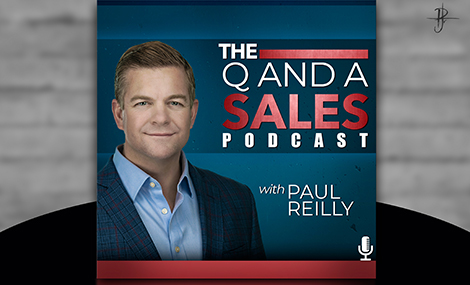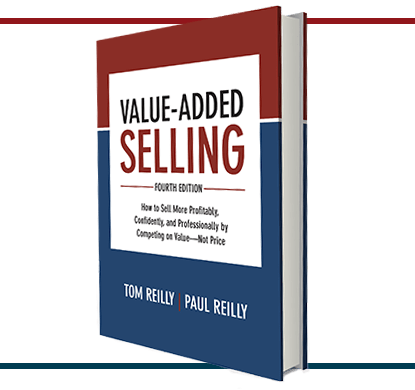Paul continues his decision-maker series by focusing in on the financial buyer (CFO/Controller).
Show Notes
These decision makers (DMs) help the other DMs make better decisions. Their science is accounting, and numbers don’t lie.
“Always determine the power-base distribution in the opportunity that you’re working.”
“These financial buyers may not be the ultimate decision maker, but they will….”
Financial buyers want to see improved cash flow and mitigate risk—so no guesswork, chance, or intuition.
Demonstrate a good return on investment (ROI).
***
Learn more: https://www.theqandasalespodcast.com.
Click here to pre-order a copy of Selling Through Tough Times!
Click here to purchase the latest edition of Value-Added Selling!
Thanks to our production team at The Creative Impostor Studios!
Click here to book a complimentary consultation with Strategist and Producer, Andrea Klunder, to find out how to launch, produce, and grow your company’s podcast.
***
Thank you for tuning in. Our show is updated weekly with the questions you ask. So, please go to the home page to ask the question that you want answered.
Be sure to follow our show in your favorite podcast app and share this episode with a colleague or friend.
And most importantly…make it a big day.
How do I sell to the financial executive?
(Transcribed from podcast)
We are now, I think, on the fourth episode, fourth episode of diving deeper into these different types of decision makers. Today we’re going to talk about the financial executive—the high-level decision maker—and what makes them tick, how they make decisions, what they want to avoid, fears they have. We’re going to dive deep into all of it.
So, before we get into that question, though, big shout-out to Andrea over at The Creative Impostor Studios. Doing a wonderful job on the podcast. Continues to grow in over 70 countries around the world. It’s amazing how quickly it’s spreading. So, Andrea, thanks for all you do. If you’ve ever thought about starting a podcast; if you want to just enhance the podcast you currently have, reach out to Andrea and her team. They will make it happen. We’re going to have a link over to The Creative Impostor Studios on this episode’s webpage.
Also make sure you pick up your latest copy of Value-Added Selling. It’s now available on Amazon, the fourth edition. It should be available on Audible soon as well. So, if you’d rather listen to it than read it, hey, you’re going to have that option here soon.
Let’s get back to that question: How do you sell to that financial buyer? So, when we talk about a financial buyer, we’re talking about an executive—a financial executive, so a CFO/controller. In Value-Added Selling, this type of decision maker is classified as a high-level decision maker. And when we say high-level decision maker, it means they can say yes to your solution where other people can just say no. [In] any organization, you’re going to meet a lot of people that can say no to you, but very few can say yes. The CFO, the controller, the financial executive, they are a high-level decision makers that can say yes to your solution.
There are three types high-level decision makers that we’re going to focus on. The first one is going to be the CFO. The next episode, we’re going to talk about the corporate executive, which is going to be the CEO or another higher-level position within an organization. And then we’re going to talk about the entrepreneur. That’s going to be the bonus episode on this series. They are different than the other decision makers. We’re going to talk about all three of them. But before I do that, though, let’s talk about the financial buyer, the financial executive.
So, you think about this financial buyer. They perceive themselves as the last line of defense against the bad decisions made by other managers who do not understand the business. You’ve got to remember, that’s first and foremost how they’re thinking is they’re thinking, “Okay, I’ve got to help these other decision makers make better decisions.” Their science is accounting, and numbers don’t lie. You’ve got to remember that. They focus on procedures and routine. The financial buyer’s power may vary in terms of input to the decision process, but that’s why it makes sense to always determine the power-base distribution in the opportunity that you’re working.
They might not be the ultimate decision maker, but they will greatly influence the ultimate decision maker who will make the decision. So, we’ve got to be aware of that. When you think about this financial executive, their business needs, their areas of interest includes profit and cashflow. That’s going to be obvious. You know, the CFO, they want to see that bottom line swell. They want to see improved cash flow. As they’re making decisions, they look at the broader financial impact on the organization, not just a profit, not just to cost, but to cashflow as well. They want to make sure that reducing cost, and also risk management is going to be important to them. They want to make sure they can mitigate any risk.
Things that they want to avoid; things that they fear: they don’t want a lot of guesswork. They don’t want to feel as though they’re too exposed. They’re not going to rely on intuition or chance to make their decision. What they want is data. What they want is they want control. They want proof. They want to make sure that the solutions that you’re providing will help mitigate risk within their organization.
I’ll give you an example of this. One of my clients, they will go into organizations—manufacturing type of facilities—and they will conduct energy audits. And the reason they do this is to identify cost-savings opportunities, or to help make the pitch for switching out some of their systems, processes, and all that, so that they can save on overall cost. When they will conduct these energy type of audits, they almost demand that a financial executive is part of this process. And the reason they do that is because they know that decision maker will greatly influence the key decision maker if they can show some value. And the CFO is the one who’s going to see the value in the numbers. They’ll show the cost savings, and then their opinion, their recommendation is going to go a long way with that CEO, if that’s the one making the decision.
So, in these energy-type of audits, again, what they’re going to be doing is detail exactly how much money they’re going to make on the return in their investment. And in these cases, you know, the soft-cost piece, that’s not as impactful as having hard data and numbers. That’s what the CFO really cares about. That’s what they’re interested in. So, when you think about CFOs, financial buyers, they could be some of your greatest advocates. And you have to be able to prove the value of your solution through numbers though. Be able to detail exactly how your solution is going to impact the buyers’ bottom line, how it’s going to help improve cashflow. That’s what you need to do when you’re selling to these types of decision makers.
Now, the products that they’re going to buy: balanced, risk-free, scientifically designed, built-on-solid-business-principle type of products. They want to eliminate that human error. They want it controlled tightly. They want a good ROI. They live in that return-on-investment world. So, make sure that you’re able to demonstrate that. When it comes to people they partner with, organizations they partner with, they want someone who’s financially stable, sensible, no nonsense. They can be trusted. And then they have a good balance sheet. Meaning, they’re financially healthy and, resources are available. They want to partner with companies that can help them grow.
So, keep that in mind. When you’re selling the value of your company to these financial type of decision makers, make sure that you’re emphasizing stability of your company. Talk about the financial viability of them as well. That’s what matters.
Make it a big day.


